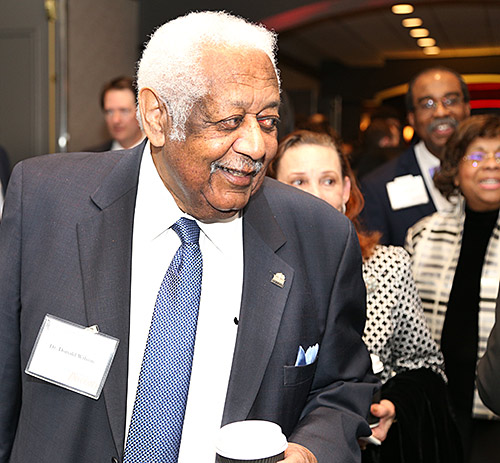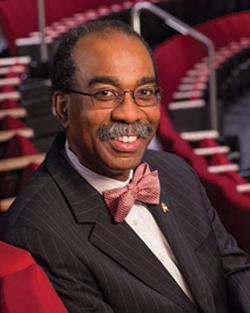May 17, 2022 | Lauren Robinson
 Medical Education Visionary will be Honored for Commitment to Promoting Diversity and Inclusion
Medical Education Visionary will be Honored for Commitment to Promoting Diversity and Inclusion
Longtime champion for health equity and advocate for minority representation in medical academia, Donald E. Wilson, MD, MACP, AGAF, Dean Emeritus at the University of Maryland School of Medicine (UMSOM), will receive the 2022 Watkins-Saunders Award given by the American Heart Association (AHA) of Baltimore & Greater Maryland. Recipients must be an individual or organization who has demonstrated outstanding commitment to overcoming health and community disparities in the state of Maryland. Dean Wilson, who served as dean of UMSOM from 1991 until his retirement in 2006, will be honored on Thursday, May 19, 2022 at the AHA’s virtual Watkins-Saunders Award Ceremony.
Dean Wilson made history as the nation’s first African American dean of a non-minority medical school in 1991. Over the course of his 15-year tenure at UMSOM, he fostered an all-inclusive atmosphere for instructing and learning. Dean Wilson was instrumental in increasing student body diversity and tripling the number of full-time underrepresented faculty at UMSOM, with the number of female faculty increasing by 75 percent. Under his leadership, external research funding grew from $77 million to $341 million, among the highest of American medical institutions at the time. UMSOM rose to the top 10% nationally of public medical schools in research funding.
Named in honor of the late Dr. Levi Watkins and late Dr. Elijah Saunders, both pioneers in the field of cardiology and two of the AHA’s greatest volunteers, the Watkins-Saunders Award was established in 2012. The prestigious award recognizes those who are dedicated to addressing the issue of ethnic and racial disparities in health care. Recipients offer new solutions to addressing the multifaceted issue of disparity and inequity through their clinical, medical, or community work. While Dean Wilson did not work directly with Dr. Watkins, he and Dr. Saunders knew each other closely. In fact, it was Dr. Saunders who repeatedly encouraged him to apply for deanship at the School of Medicine.
 “To say that Don Wilson is a qualified recipient of this award would be an understatement,” said Dean E. Albert Reece, MD, PhD, MBA, who is also the vice president for Medical Affairs, University of Maryland, and the John Z. and Akiko K. Bowers Distinguished Professor. “I do not believe there is anyone more deserving of this great honor. Don is truly a visionary. He envisioned the School of Medicine being a driving force behind encouraging diversity and equity in medicine. We are fortunate to be the ones carrying his torch forward, and we extend our most heartfelt congratulations on this momentous honor.”
“To say that Don Wilson is a qualified recipient of this award would be an understatement,” said Dean E. Albert Reece, MD, PhD, MBA, who is also the vice president for Medical Affairs, University of Maryland, and the John Z. and Akiko K. Bowers Distinguished Professor. “I do not believe there is anyone more deserving of this great honor. Don is truly a visionary. He envisioned the School of Medicine being a driving force behind encouraging diversity and equity in medicine. We are fortunate to be the ones carrying his torch forward, and we extend our most heartfelt congratulations on this momentous honor.”
Dean Wilson recalls the lack of minority representation in his hometown of Worcester, Massachusetts. “There was only one doctor of color in the town,” said UMSOM Dean Emeritus Wilson. “I realized, even then, we had a deficiency of representation in terms of who you could go see – not that white doctors would not see you – but if you were more comfortable going to a person of color, you only had one choice.” This trend continued throughout his medical education as Dean Wilson recalled, “I never saw a black professor.”
His position as Dean allowed other people of color to see themselves through him. “We started getting more students of color who were interested in the University of Maryland. Being at Maryland as a role model, they assumed that might make it a friendlier place,” he said.
Dean Wilson understood that fostering inclusivity at UMSOM was not a choice, but rather a necessity if the school was going to be the best at preparing medical students.
“I did not come to Maryland to increase diversity; I came to Maryland to improve the medical school,” said UMSOM Dean Emeritus Wilson. “I believe you can not reach the best possibilities, unless you have a diverse group of people working with you and advising you. So, increasing diversity was going to help the medical school.”
Dean Wilson has held several leadership positions in medical and academic organizations throughout his career, including chairing the Association of American Medical Colleges (AAMC) in 2004, chairing the Maryland Health Care Commission from 1994 to 2004, and founding the Association for Academic Minority Physicians in 1986. He is a member of the Institute of Medicine of the National Academy of Sciences, the Association of American Physicians, and the American Clinical and Climatological Association. He served as vice president of the Alpha Omega Alpha (AOA) national board of directors from 2004-2011 and is a Master of the American College of Physicians.
He completed his undergraduate education at Harvard College (now University), where he was one of seven black students in his class of 1,172. He earned his medical degree from Tufts University School of Medicine in 1962. He has served as chief of gastroenterology at the University of Illinois Medical School in Chicago and Chairman of Medicine at SUNY, Downstate in Brooklyn. He holds Honorary Doctor of Science degrees from the University of Maryland, Baltimore, Tufts University and SUNY, Downstate.
Dean Wilson is the proud recipient of numerous professional awards. In 2000, he received the AAMC’s first Herbert Nickens Award for promoting equality and Justice in Medicine. In 2004, he received the National Institute of Child Health and Human Development’s (NIH) first Extramural Associates Distinguished Service Award. In 2006, he received the National Medical Association’s Distinguished Service Award, and he was the first recipient of the Institutional Leadership Diversity Award from the AAMC Group on Student Affairs-Minority Affairs Section. Baltimore Magazine named him Baltimorean of the Year in 2007. In 2008, he received the Abraham Flexner Award from the AAMC, an award given to an individual who has had a major impact on medical education nationally.
About the University of Maryland School of Medicine
Now in its third century, the University of Maryland School of Medicine was chartered in 1807 as the first public medical school in the United States. It continues today as one of the fastest growing, top-tier biomedical research enterprises in the world -- with 46 academic departments, centers, institutes, and programs, and a faculty of more than 3,000 physicians, scientists, and allied health professionals, including members of the National Academy of Medicine and the National Academy of Sciences, and a distinguished two-time winner of the Albert E. Lasker Award in Medical Research. With an operating budget of more than $1.3 billion, the School of Medicine works closely in partnership with the University of Maryland Medical Center and Medical System to provide research-intensive, academic and clinically based care for nearly 2 million patients each year. The School of Medicine has nearly $600 million in extramural funding, with most of its academic departments highly ranked among all medical schools in the nation in research funding. As one of the seven professional schools that make up the University of Maryland, Baltimore campus, the School of Medicine has a total population of nearly 9,000 faculty and staff, including 2,500 students, trainees, residents, and fellows. The combined School of Medicine and Medical System (“University of Maryland Medicine”) has an annual budget of over $6 billion and an economic impact of nearly $20 billion on the state and local community. The School of Medicine, which ranks as the 8th highest among public medical schools in research productivity (according to the Association of American Medical Colleges profile) is an innovator in translational medicine, with 606 active patents and 52 start-up companies. In the latest U.S. News & World Report ranking of the Best Medical Schools, published in 2021, the UM School of Medicine is ranked #9 among the 92 public medical schools in the U.S., and in the top 15 percent (#27) of all 192 public and private U.S. medical schools. The School of Medicine works locally, nationally, and globally, with research and treatment facilities in 36 countries around the world. Visit medschool.umaryland.edu
Contact
Lauren Robinson
Public Affairs/Community Health Specialist
Managing Editor, SOM News
Office of Public Affairs & Communications
University of Maryland School of Medicine
Lauren.Robinson@som.umaryland.edu
Office: 410.706.7508
Related stories

Thursday, March 05, 2020
13th Annual “Celebrating Diversity” Dinner Supports Student Scholarships
UMSOM Award Recipients Honored for Promoting Health Equity and Career Advancement for Underrepresented Groups

Wednesday, March 01, 2017
Tenth Annual “Celebrating Diversity” Dinner Supports Funding for Minority Student Scholarships
The University of Maryland School of Medicine (UM SOM) held its tenth annual “Celebrating Diversity” reception and dinner on February 25, 2017 at the Baltimore Hilton Inner Harbor. The event was attended by nearly 300 guests, who gathered to honor diversity at UM SOM, recognize those who have helped increase its diversity, and to raise money for an endowed scholarship in the name of Dean Emeritus Donald E. Wilson, MD, MACP, AGAF.

